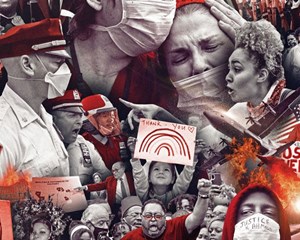OUR AWFUL YEAR
糟糕的一年
2020 TESTED US BEYOND MEASURE. WHERE DO WE GO FROM HERE?
2020年对我们的考验无以估量,下一步该怎么走?
THIS IS THE STORY OF A YEAR YOU'LL NEVER WANT TO REVISIT.
这一年发生的事情你绝对不想重温
There have been worse years in U.S. history, and certainly worse years in world history, but most of us alive today have seen nothing like this one. You would need to be over 100 to remember the devastation of World War I and the 1918 flu pandemic; roughly 90 to have a sense of the economic deprivation wrought by the Great Depression; and in your 80s to retain any memory of World War II and its horrors. The rest of us have had no training wheels for this—for the recurrence of natural disasters that confirm just how much we have betrayed nature; for an election contested on the basis of fantasy; for a virus that originated, possibly, with a bat only to upend the lives of virtually everyone on the planet and end the lives of roughly 1.5 million people around the world.
美国历史上曾有过糟糕的岁月,当然,世界史上也有过糟糕的岁月。然而,大多活在当今时代的我们却从未经历过如今这般糟糕的境地。你需要在100岁以上才能记得第一次世界大战的破坏和1918年的西班牙大流感;你需要在大约90岁才能体会到大萧条时期的经济匮乏;你需要在80多岁才能对第二次世界大战的恐怖为之一颤。剩下的人呢?则对重大变故毫无经验——自然灾害再现,证实了我们对自然的背叛程度;一场基于幻想的选举;一种可能起源于蝙蝠的病毒,打乱了地球上几乎所有人的生活,终结了全球约150万人的生命。
My job as a film critic is to look at movies and tease out their connections both to the greater world and to our lives. If 2020 were a dystopian movie, you'd probably turn it off after 20 minutes. This year wasn't doomily thrilling, like a fictional apocalypse. It was, in addition to being wrought with pain, maddeningly mundane, the routine of the everyday turned against us.
作为影评人,我的工作就是看电影,梳理出它们与更广阔的世界和我们的生活之间的联系。如果《2020》是一部反乌托邦电影,你可能看了20分钟就会关掉。今年并没有像虚构的世界末日那样惊心动魄,除了被痛苦折磨,它单调得令人发狂,循环往复的日常生活让人难以忍受。

Our most debilitating threat this year was a sense of helplessness, and it ran unchecked. Although it's universal among humans to believe in their own fortitude, Americans, in particular, are conditioned to believe they can triumph over any crisis. But not since the spread of fascism in the 1930s—a threat America didn't actively recognize until the dawn of the 1940s—have we been faced with so many abnormal events that have been so egregiously distorted by aberrant leadership. We confronted the unspeakable, only to be deviously reassured that none of it was a big deal. A virus will magically "disappear." Don't worry, every vote will be counted—maybe. America will be great again, if only everybody would just get back to work—and though a mask is optional, wearing one sure makes you look dumb.
今年,我们面临的最令人衰弱的威胁是一种无助感,而且这种无助感一直在蔓延。虽然大多数人类都相信自己的坚韧,尤其是美国人,他们习惯于相信自己能够战胜任何危机。但自从20世纪30年代法西斯主义蔓延以来——美国直到20世纪40年代才真正认识到这一威胁——我们从未面临过如此多的异常事件,这些异常事件被神经质的领导人严重扭曲。我们面对的是不可奉告的事情,只是被间接保证一切安好。病毒会神奇般地“消失”。不用担心,每张选票都会被计算在内——或许吧。只要大家都回去工作,美国就会再次伟大——虽然你可以选择戴不戴口罩,但戴了肯定会显得你很蠢。
Gaslighting has been a major feature of American civic life since 2016, but in 2020 it reached new heights of outlandishness, making many of us feel as if we'd been pushed to the other side of the looking glass. We spent countless hours stuck at home and connected to the often untrustworthy hive mind of social media, wringing our hands and pointing out injustices, only to end up feeling even more paralyzed by the very people who are meant to protect us. The enemy sought to divide us, and succeeded.
自2016年以来,“煤气灯效应”一直是美国公民生活的一大特色,但到了2020年,它的离奇程度上升到了新的高度,很多人感觉自己好像被推到了镜子的另一边。我们花了无数个小时呆在家里,与社交媒体上那些通常不值得信任的蜂群思维联系在一起,搓着手对不公正的事情指指点点,结果却被本应保护我们的人搞得更加不知所措。敌人企图分裂我们,并且成功了。
译文由可可原创,仅供学习交流使用,未经许可请勿转载。











